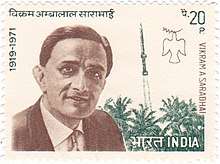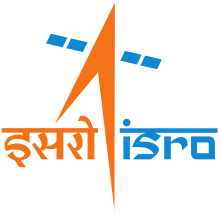Vikram Sarabhai
Vikram Ambalal Sarabhai (12 August 1919 – 30 December 1971) was an Indian physicist and astronomer who initiated space research and helped develop nuclear power in India. He was honoured with Padma Bhushan in 1966 and the Padma Vibhushan (posthumously) in 1972. He is internationally regarded as the Father of the Indian Space Program.[6]
Vikram Sarabhai | |
|---|---|
 Sarabhai signing a space research cooperation agreement at NASA in 1969 | |
| Born | Vikram Ambalal Sarabhai 12 August 1919[1] Ahmedabad, Bombay Presidency, British India |
| Died | 30 December 1971 (aged 52) |
| Nationality | Indian |
| Alma mater | University of Cambridge (BA, PhD) |
| Known for | Indian space program Indian Institute of Management Ahmedabad |
| Spouse(s) | Mrinalini Sarabhai |
| Children | Mallika Sarabhai (daughter)[2][3][4][5]
Kartikeya Sarabhai (son) |
| Awards | Padma Bhushan (1966) Padma Vibhushan (posthumously) (1972) |
| Scientific career | |
| Fields | Physics |
| Institutions | Indian Space Research Organisation Physical Research Laboratory |
| Doctoral advisor | C. V. Raman |
| Doctoral students | Udupi Ramachandra Rao |
Vikram Sarabhai | |
|---|---|
| Chairman, Indian National Committee for Space Research and Indian Space Research Organisation | |
| In office 1963–1971 | |
| Preceded by | Position established |
| Succeeded by | M. G. K. Menon |
Personal life

Son of Ambalal Sarabhai, he came from the famous Sarabhai family of India who were major industrialists committed to the Indian independence movement. Vikram Sarabhai married the classical dancer Mrinalini in 1942. The couple had two children. His daughter Mallika gained prominence as an actress and activist, and his son Kartikeya too became an active person in science. During his lifetime, he practiced Jainism.[7] He attended Gujarat College, Ahmedabad, but later shifted to the University of Cambridge, England, where he took his tripos in natural sciences in 1940.[8] In 1945 he returned to Cambridge to pursue a doctorate and wrote a thesis, “Cosmic Ray Investigations in Tropical Latitudes,” in 1947.[8]
Professional life
Known as the cradle of space sciences in India, the Physical Research Laboratory (PRL) was founded in 1947 by Vikram Sarabhai.[9] PRL had a modest beginning at his residence, the "RETREAT", with research on cosmic rays.
The institute was formally established at the M.G. Science Institute, Ahmedabad, on 11 November 1947[10] with support from the Karmkshetra Educational Foundation and the Ahmedabad Education Society. Prof. Kalpathi Ramakrishna Ramanathan was the first Director of the institute. The initial focus was research on cosmic rays and the properties of the upper atmosphere. Research areas were expanded to include theoretical physics and radio physics later with grants from the Atomic Energy Commission.
He led the Sarabhai family-owned business conglomerate. His interests varied from science to sports to statistics. He set up the Operations Research Group (ORG), the first market research organization in the country. Most notable among the many institutes he helped set up are the Nehru Foundation for Development in Ahmedabad, the Indian Institute of Management Ahmedabad (IIMA), the Ahmedabad Textile Industry's Research Association (ATIRA) and the (CEPT). Along with his wife Mrinalini Sarabhai, he founded the Darpana Academy of Performing Arts. Other projects and institutions initiated or established by him include the Fast Breeder Test Reactor (FBTR) in Kalpakkam, Variable Energy Cyclotron Project in Calcutta, Electronics Corporation of India Limited (ECIL) in Hyderabad and Uranium Corporation of India Limited (UCIL) in Jaduguda, Jharkhand.
Sarabhai started a project for the fabrication and launch of an Indian satellite. As a result, the first Indian satellite, Aryabhata, was put in orbit in 1975 from a Russian cosmodrome.[9] He was the founder of Indian Space Research Organisation.
==Indian Institute of Management (IIM), Ahmedabad
Distinguished positions
- President of the Physics section, Indian Science Congress (1962)
- President of the General Conference of the I.A.E.A., Vienna (1970)
- Chairman of the Atomic Energy Commission of India (1966–1971)[11][12]
- Vice-President, Fourth UN Conference on 'Peaceful uses of Atomic Energy' (1971)
- Founder and Chairman (1963–1971), Space Applications Centre[13]
Legacy

- The Vikram Sarabhai Space Centre, (VSSC), which is the Indian Space Research Organization's lead facility for launch vehicle development located in Thiruvananthapuram (Trivandrum), capital of Kerala state, is named in his memory.
- Along with other Ahmedabad-based industrialists, he played a major role in setting up of the Indian Institute of Management, Ahmedabad.
- Indian Postal Department released a commemorative Postal Stamp On his first death anniversary (30 December 1972)
- In 1973, the International Astronomical Union decided that a lunar crater, Bessel A, in the Sea of Serenity will be known as the Sarabhai crater.[14][15]
- The lander on India's moon mission Chandrayaan-2 which was to land near the South Pole of the moon on Sep 20, 2019 was named Vikram in his honour.
- Vikram A Sarabhai Community Science Centre (VASCSC) located in Ahmedabad, Gujarat is named after him. Vikram Sarabhai established this institute around the 1960s.
- Former World Quiz Champion Vikram Joshi was named after him.
References
- "Vikram Sarabhai Biography". mapsofindia.com. mapsofindia. 30 January 2014. Retrieved 22 July 2015.
- "Mystery behind Vikram Sarabhai's death". Times of India. 30 December 2008. Retrieved 22 July 2015.
- "Vikram Sarabhai's love affair gave birth to IIM-A". Times of India. 8 January 2014. Retrieved 22 July 2015.
- "Witness to persecution". tribuneindia. 14 January 2006. Retrieved 22 July 2015.
- Amrita Shah (2007) Vikram Sarabhai: A Life. Penguin Viking. ISBN 0-670-99951-2
- "Padma Awards Directory (1954–2013)" (PDF). Ministry of Home Affairs, Government of India. 14 August 2013. Archived from the original (PDF) on 15 October 2015. Retrieved 21 July 2015.
- "Jains steal the show with 7 Padmas". The times of India. Times of India. 9 April 2015. Retrieved 9 December 2015.
The Jain community has always nurtured exceptional talent whether it is eminent scientist Vikram Sarabhai, who is considered the father of the country's space program, or poet, thinker and spiritual leader Banarsidas who composed the magnum opus Ardhakathanaka, the first-ever autobiography in Hindi literature.
- "Vikram Sarabhai founder of ISRO 100th Birthday: All you need to know". jagranjosh.com. Retrieved 12 August 2019.
- R., Parthasarathy (3 April 2003). "Vikram Sarabhai (1919-1971): Architect of Indian space programme". www.thehindu.com. Retrieved 10 August 2019.
- "BRIEF HISTORY". Physical Research Laboratory, Department of Space, Government of India. Archived from the original on 8 April 2016. Retrieved 28 March 2016.
- "From the Archives (May 23, 1969): Sarabhai assails faltering nuclear policy". The Hindu. 23 May 2019. ISSN 0971-751X. Retrieved 10 August 2019.
- "Former Chairmen of Atomic Energy Commission" (PDF). Government of India Department of Atomic Energy. 5 June 2012. Retrieved 10 August 2019.
- "Space Applications Centre". www.sac.gov.in. Retrieved 10 August 2019.
- Antonín Rükl: Atlas Měsíce, Aventinum (Praha 1991), chapter Bessel, page 74, ISBN 80-85277-10-7 (in Czech)
- Sarabhai (crater) – "Planetary Names: Sarabhai on Moon;". Gazetteer of Planetary Nomenclature, IAU, USGS, NASA. 18 October 2010. Retrieved 22 July 2015.
- https://www.google.com/doodles/vikram-sarabhais-100th-birthday
External links
| Wikiquote has quotations related to: Vikram Sarabhai |
| Wikimedia Commons has media related to Vikram Sarabhai. |
| Government offices | ||
|---|---|---|
| Preceded by Position created |
ISRO Chairman 1963–1971 |
Succeeded by M. G. K. Menon |
